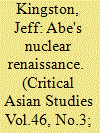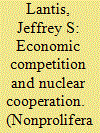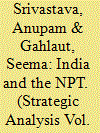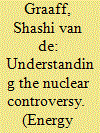|
|
|
Sort Order |
|
|
|
Items / Page
|
|
|
|
|
|
|
| Srl | Item |
| 1 |
ID:
132902


|
|
|
|
|
| Publication |
2014.
|
| Summary/Abstract |
Prime Minister Abe Shinz()'s nuclear renaissance involves downplaying risks, restarting reactors, building new ones, and exporting reactor technology and equipment. Polls in japan indicate that the public remains overwhelmingly op- posed to Abe's nuclear agenda, but in various national and local elections since late 2012 antinuclear candidates have not fared well. This article examines the disjunc-ture between public preferences and electoral outcomes and why is it likely that Japan will restart reactors despite widespread concerns about safety, the high costs of nuclear energy, and the lack of a site for permanent disposal of nuclear waste. The safety myth is being reealibrated, but the author argues that it remains based on rosy assumptions in a nation especially prone to massive seismic disasters. The reinstatement of nuclear energy in the 2014 national energy policy marks a victory for the nuclear village, a remarkable example of institutional resilience in the face of extremely adverse developments since the massive earthquake and tsunami of 1 1 March 2011 that precipitated three reactor meltdowns in Fukushima. Despite extensive revelations about shoddy safety practices in the nuclear industry and collusive relations between regulators and those they regulate, Abe has successfully promoted a nuclear revival that few would have thought possible before his election in 2012. Reactor restarts face a number of hurdles, but the pronuclear lobby now finds it has a policy opening. The summer of 2014 has been a nuclear-free one, but in all likelihood it will be Japan's last for decades to come.
|
|
|
|
|
|
|
|
|
|
|
|
|
|
|
|
| 2 |
ID:
127622


|
|
|
|
|
| Publication |
2014.
|
| Summary/Abstract |
The number of bilateral nuclear cooperation agreements surged during the "nuclear renaissance" of the past decade. This proliferation is only partially explained by the prevailing approaches that focus on strategic imperatives. To supplement these explanations, this study draws on neoliberal models of economic competition to posit that bilateral agreement negotiations also exhibit conditions of "uncoordinated interdependence" and maneuvering to gain market share. Case evidence suggests the contours of supplier state bids for civilian assistance are determined at least as much by considerations about economic competition as they are by positive strategic goals. In addition, this study identifies several cases of cooperation where there appears to be little or no strategic motive for export agreements. The study concludes that patterns of economic competition and the influence of peers in defined competitive spaces alter material payoffs and impact policies. It also identifies a surprising role for principled restraint in dampening strategic and economic competition in some dyads.
|
|
|
|
|
|
|
|
|
|
|
|
|
|
|
|
| 3 |
ID:
094503


|
|
|
|
|
| Publication |
2010.
|
| Summary/Abstract |
This article examines the feasibility and advisability of India joining the Non-Proliferation Treaty (NPT). It demonstrates that (a) the non-proliferation regime, which is larger and more varied than the NPT, has received significant cooperation from India in the past; (b) that in order to effectively deal with future challenges from nuclear renaissance, nuclear deterrence, and terrorism, the regime will need to craft creative, non-NPT centric solutions like the US-India nuclear agreement, to co-opt India; and (c) that India's interest will be better served by trying to shape the regime from within rather than remaining a reasoned voice from without.
|
|
|
|
|
|
|
|
|
|
|
|
|
|
|
|
| 4 |
ID:
162969


|
|
|
|
|
| Summary/Abstract |
In the late 1990s, a new generation of reactor designs evolved from existing designs was touted as solving the economic problems that led to the collapse of reactor ordering after the Chernobyl disaster. It was claimed these designs would be cheap and easy to build because they would be simpler and use passive safety, modular construction and standardisation. The US and UK governments were convinced by this and launched reactor construction programmes. However, 20 years on, the claims have proved false and the US and UK programmes are in disarray. The last hope for the nuclear industry appears to be that Chinese and Russian reactor vendors, with powerful support from their governments, will take over, providing reactors that are cheap but meet the safety standards required in Europe and North America. However, these vendors and their designs are largely unproven in open markets. There is also little evidence that their reactors will be cheap, there are concerns about quality and safety culture and there are national security concerns that may deter customers. New technologies, such as radical new ones, Generation IV, and Small Modular Reactors are unproven and, at best, a long way from commercial deployment
|
|
|
|
|
|
|
|
|
|
|
|
|
|
|
|
| 5 |
ID:
115107


|
|
|
|
|
| Publication |
2012.
|
| Summary/Abstract |
For the future of nuclear power it will be decisive whether or not nuclear fission technologies offer a sustainable solution to global energy problems. The impressive expansion of nuclear reactors in the 1960s and 1970 slowed down after the meltdown in Harrisburg and the nuclear explosion in Chernobyl. Since the end of the 1980s installed nuclear capacity has stagnated, and in Europe declined. However, a nuclear revival or renaissance has been predicted for 30 years. This article reviews global scenarios and national nuclear programmes and analyses problems in the nuclear industry. Special attention is given to nuclear power and global warming and the nexus between nuclear power and nuclear proliferation.
|
|
|
|
|
|
|
|
|
|
|
|
|
|
|
|
| 6 |
ID:
112815


|
|
|
|
|
| Publication |
2012.
|
| Summary/Abstract |
THE YEAR 2012 MARKS the ten-year anniversary of UN General Assembly resolution 57/60 and the UN Secretary-General's report on disarmament and non-proliferation education.1 At the very beginning of the 21st century, it became clear that a new wave of interest in atomic energy, dubbed the "nuclear renaissance," is engulfing an ever greater number of states. Nuclear technologies and materials have not yet become an object of common everyday use, but access to them by new countries, companies and people is increasing. Accordingly, the risks are growing of their falling into "unclean hands." Throughout the world, people know that one cannot walk across the road on a red light, every person traveling in a motor vehicle must wear a seat belt, and on crowded public transport you need to watch your wallet. Society develops rules for behavior that are easy to understand and taught to us since early childhood, helpful in protecting life and making it more comfortable.
|
|
|
|
|
|
|
|
|
|
|
|
|
|
|
|
| 7 |
ID:
101872


|
|
|
|
|
| Publication |
2010.
|
| Summary/Abstract |
THERE IS A WELL ESTABLISHED VIEW that an administrative decision today can be correctly assessed and understood only by those who were directly involved in its elaboration and approval that is to say, administrators themselves. All others are destined to remain outside the bounds of the established democratic (or bureaucratic) procedure. Not only are they not in a position to influence the choice of a development scenario the choice is not even explained to them.
|
|
|
|
|
|
|
|
|
|
|
|
|
|
|
|
| 8 |
ID:
091928


|
|
|
| 9 |
ID:
150035


|
|
|
|
|
| Summary/Abstract |
The need for a secure and sustainable energy future has become firmly entrenched on the global political agenda. Governments worldwide are seeking solutions that will ensure security of their energy supplies, while reducing carbon emissions in the fight against climate change. Advocates of nuclear power have reframed the technology as the most reliable, cost-effective and immediate solution to both of these policy problems, and predicted the emergence of a 'nuclear renaissance’. However, there is little evidence to date that suggests a nuclear renaissance has actually taken place. Public opinion polling demonstrates that many remain unconvinced of the need for nuclear power. This paper uses Cultural Theory as a heuristic to understand why the arguments for a nuclear renaissance have been largely unsuccessful. It argues that the failure of nuclear advocates to engage with a wider cross-section of world-views has prevented the controversy surrounding nuclear power from being resolved, and the nuclear renaissance from becoming a reality. In doing so, this paper builds upon a growing recognition of the contribution that social science research can make to understanding public acceptance of energy policy choices.
|
|
|
|
|
|
|
|
|
|
|
|
|
|
|
|
| 10 |
ID:
113412


|
|
|
|
|
| Publication |
2012.
|
| Summary/Abstract |
Intuitively, the Fukushima disaster should have a major impact on the future of the nuclear industry. This paper argues that there are four possible answers to the question what will Fukushima change: everything because the nuclear industry cannot survive another Chernobyl; the impact will vary according to location; it is too early to determine the impact; and the nuclear industry was facing serious problems that Fukushima will do no more than exacerbate. We focus on the last answer, arguing that the new designs that were expected to be so attractive as to power a 'Nuclear Renaissance' were already failing. The promises that they would be safer, but simpler, therefore cheaper and more buildable were unachievable and the Renaissance in the West had already failed. If the nuclear industry is to have a future, it might be through a shift in locus from North America and Western Europe to China, Russia and India. However, it is not clear that these countries can avoid the techno-economic issues that have derailed the nuclear industry in the West. The prospect that the nuclear industry can be saved by a radical new generation of designs is a long way off and still a remote possibility.
|
|
|
|
|
|
|
|
|
|
|
|
|
|
|
|
|
|
|
|
|